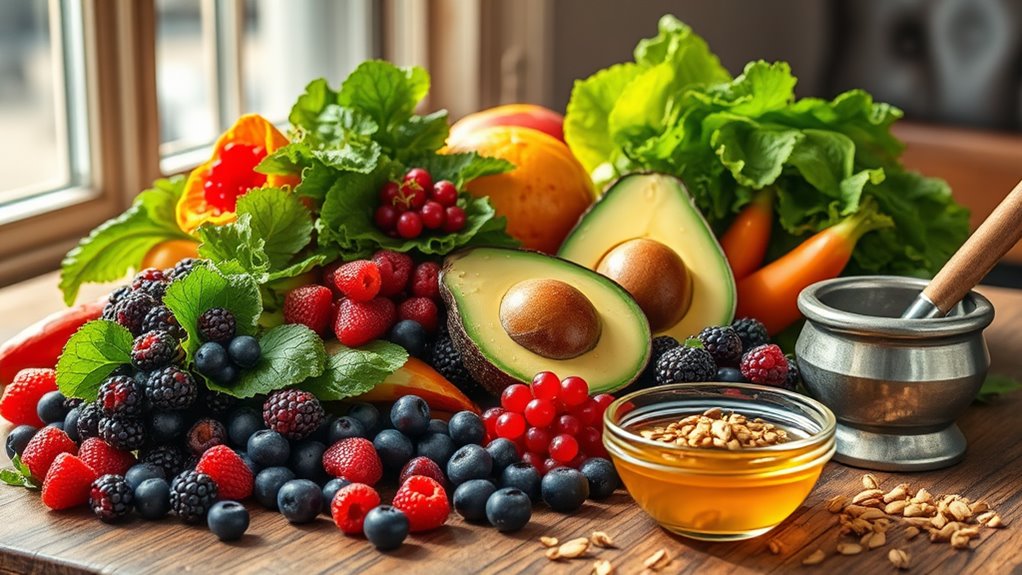The Nutritionist’s Guide to Glowing Skin From Food
To achieve glowing skin, focus on nourishing your body with the right foods. Incorporate omega-3 fatty acids, essential vitamins A, C, and E, and key minerals like zinc and copper into your diet. Don’t forget about antioxidants from berries and greens, which protect your skin. Plus, maintain gut health with fiber and fermented foods for a radiant complexion. Hydrating foods like avocados, coconut oil, and watery fruits can enhance your skin’s moisture and glow—there’s more to discover on this journey!
Key Takeaways
- Incorporate omega-3 fatty acids from fatty fish, flaxseeds, and walnuts to reduce inflammation and enhance skin hydration.
- Consume vitamins A, C, and E through fruits and vegetables to support collagen production and protect against UV damage.
- Include zinc, copper, and selenium-rich foods to boost skin elasticity and overall vitality.
- Prioritize hydrating foods like avocados, watermelon, and cucumbers to maintain skin moisture and promote a radiant complexion.
- Support gut health with fiber-rich and fermented foods to enhance nutrient absorption and improve skin appearance.
The Role of Omega-3 Fatty Acids in Skin Health
When it comes to achieving glowing skin, omega-3 fatty acids play an essential role in maintaining your skin’s health. Incorporating omega-3-rich foods into your diet is one of the best glowing skin food tips.
You can find ALA in plant sources like flaxseeds, chia seeds, and walnuts, while EPA and DHA are abundant in fatty fish like salmon and sardines. These fatty acids help reduce inflammation, calm irritated skin, and support hydration by maintaining your skin’s moisture barrier. Additionally, omega-3s are essential for overall health, as the body cannot produce them on its own. Studies have shown that nutrient-rich foods can significantly contribute to skin health and vitality.
They also promote collagen production, enhancing elasticity and minimizing fine lines. By balancing oil production, omega-3s can clear pores, giving you that radiant complexion you desire.
Don’t underestimate these powerful nutrients for your skin health journey!
Essential Vitamins for Radiant Skin
Achieving radiant skin goes beyond just omega-3 fatty acids; vitamins also play a significant role in your skin’s health and appearance.
Essential vitamins like A, C, and E are key players in promoting a glowing complexion. Here’s how they help:
-
Vitamin A: Supports skin cell production and reduces signs of aging. Consuming foods rich in nutrients and antioxidants can further enhance the benefits of vitamin A for your skin.
-
Vitamin C: Essential for collagen production, keeping your skin firm and youthful.
-
Vitamin E: Acts as a powerful antioxidant, protecting against UV damage.
Incorporating these vitamins into your diet through foods like sweet potatoes, citrus fruits, and nuts can enhance your skin’s health. Additionally, a balanced diet rich in these vitamins is fundamental for maximizing their impact on your skin.
Remember, balanced nutrition is fundamental for maximizing the impact of these vitamins on your skin.
Antioxidants and Their Impact on Skin Protection
Antioxidants play an essential role in protecting your skin from damage caused by environmental factors like pollution and UV rays. They combat free radicals and oxidative stress, which can lead to premature aging and skin cancer. Regular consumption of antioxidant-rich foods is associated with a lower risk of skin cancer and minimizes sunburn and harmful effects of UV exposure. Additionally, a diet rich in plant-derived antioxidants can significantly enhance skin health.
You can find antioxidants in a variety of foods, including berries, leafy greens, nuts, and dark chocolate. Incorporating these foods into your diet helps improve skin hydration, elasticity, and overall appearance.
Vitamins A, C, and E are particularly effective, promoting collagen production and protecting against inflammation. Additionally, plant-derived antioxidants like polyphenols and carotenoids shield your skin from UV damage.
Key Minerals for Skin Vitality
To achieve vibrant skin, you need to focus on key minerals like zinc, copper, and selenium. Zinc helps with wound healing and skin protection, while copper boosts collagen production for elasticity. Selenium acts as a powerful antioxidant, safeguarding your skin from damage and supporting its overall health. Additionally, incorporating foods rich in essential vitamins can further enhance your skin vitality. A diet abundant in beauty nutrition not only supports your skin’s appearance but also contributes to your overall health.
Essential Zinc Sources
What makes zinc an essential mineral for your skin’s health? Zinc plays an important role in maintaining skin vitality, promoting healing, and preventing acne. Including zinc-rich foods in your diet can greatly enhance your skin’s appearance. Additionally, nutrient-rich foods can promote healthy, glowing skin, preventing and reversing skin damage. Here are some great sources of zinc to take into account:
- Oysters: Packed with zinc, they’re one of the best options.
- Pumpkin Seeds: A fantastic plant-based source for vegans and vegetarians.
- Dark Chocolate: A tasty treat that also delivers a healthy dose of zinc. Furthermore, consuming antioxidant-rich foods can help protect your skin from oxidative stress.
Collagen-Boosting Copper
Zinc is important for skin health, but copper also plays a significant role in maintaining your skin’s vigor. This essential mineral aids in collagen synthesis, ensuring your skin remains youthful and firm.
Copper stabilizes collagen fibers, enhancing elasticity and resilience, while also supporting elastin production for tighter skin. Additionally, it promotes wound healing by encouraging new blood vessel formation and collagen production.
Incorporating copper-rich foods like amaranth, lentils, green apples, and almonds into your diet can boost your skin health.
Consider using skincare products with copper peptides for their anti-aging benefits, as they improve texture and reduce inflammation. With consistent use, you’ll notice a clearer, healthier complexion—making copper an indispensable ally for your skin.
Antioxidant-Rich Selenium
Selenium, a powerful antioxidant, plays an essential role in maintaining skin vigor. By combating free radicals, it protects your skin from oxidative stress and helps maintain elasticity. Incorporating selenium into your diet can considerably enhance your skin’s health.
Consider these benefits:
- Free Radical Protection: Shields skin cells, preventing damage and maintaining elasticity.
- UV Damage Protection: Reduces fine lines and wrinkles by guarding against UV radiation.
- Cell Renewal: Aids in cell growth, promoting a youthful appearance.
You can find selenium in foods like Brazil nuts, tuna, and whole grains.
The Connection Between Gut Health and Skin Appearance
While you mightn’t immediately associate gut health with your skin’s appearance, the connection is profound and undeniable. Your gut microbiome plays an essential role in how your skin looks and feels.
An imbalanced gut can lead to inflammation, worsening conditions like acne and eczema. It also affects nutrient absorption—your skin needs vitamins A, C, E, and zinc for that healthy glow.
Additionally, the gut-skin axis links your immune system to your skin, impacting conditions like rosacea and dry skin.
To promote radiant skin, focus on a fiber-rich diet, incorporate fermented foods, and minimize processed sugars. By nurturing your gut, you’re investing in healthier, more vibrant skin.
Hydrating Foods and Herbs for Moisture and Glow
To achieve that radiant glow, incorporating hydrating foods and herbs into your diet is key.
Avocados pack healthy fats that keep your skin moisturized, while coconut oil can work wonders for hydration.
Plus, fruits and herbs provide essential nutrients that enhance your skin’s moisture and overall appearance.
Avocados for Skin Hydration
If you’re looking to boost your skin’s hydration, incorporating avocados into your diet can make a significant difference.
These creamy fruits are packed with water and essential nutrients that support healthy skin. Here’s how avocados help maintain moisture and glow:
- They’re about 72% water, directly enhancing skin hydration.
- Rich in monounsaturated fats, they strengthen your skin barrier.
- Vitamins C and E provide moisturizing effects and protect against oxidative stress.
Including avocados in your meals can improve your skin’s firmness and elasticity.
Aim for one avocado a day to reap these benefits and enjoy a more hydrated, radiant complexion.
It’s a delicious way to nourish your skin from the inside out!
Benefits of Coconut Oil
Coconut oil is a powerhouse moisturizer that can transform your skincare routine. Its deeply hydrating properties lock in moisture, making it perfect for dry skin.
With lauric acid at its core, coconut oil offers antimicrobial benefits that help prevent skin infections, while its anti-inflammatory qualities soothe conditions like dermatitis and eczema. Additionally, it acts as an antioxidant, neutralizing free radicals and promoting skin health.
When you apply coconut oil to damp skin, you maximize moisture retention and boost collagen production, enhancing elasticity and firmness.
Just be cautious—avoid using it on acne-prone areas to prevent breakouts. Incorporate this natural, cost-effective moisturizer into your regimen for long-lasting hydration and a radiant glow!
Hydration From Fruits and Herbs
Incorporating hydration into your skincare routine goes beyond topical treatments like coconut oil; it also involves nourishing your body with hydrating foods and herbs.
Adding water-rich fruits and herbs can greatly enhance your skin’s moisture and glow. Consider these powerhouse options:
-
Watermelon: Packed with 92% water and vitamins, it hydrates and reduces inflammation.
-
Cucumber: Its high water content hydrates your skin and can be used in infusions.
-
Aloe Vera: Known for soothing properties, it helps protect against environmental stressors.
Frequently Asked Questions
How Quickly Can Diet Impact Skin Appearance?
You might not notice it right away, but your diet can begin transforming your skin in about 28 days. Consistency is key, as gradual improvements unfold, revealing the beauty hidden beneath. Patience pays off.
Are There Specific Foods to Avoid for Better Skin?
To improve your skin, avoid alcohol, refined carbohydrates, dairy, sugary foods, and processed meats. These can trigger inflammation, disrupt hormones, and lead to premature aging. Choosing whole foods can enhance your skin’s appearance considerably.
Can Supplements Replace Whole Foods for Skin Health?
Imagine a garden thriving with diverse plants; that’s your skin with whole foods. Supplements can help, but they often lack the synergy of nutrients found in whole foods, which nourish your skin more effectively.
What Role Does Hydration Play in Skin Health?
Hydration plays an essential role in your skin health. It enhances elasticity, flushes toxins, and maintains moisture balance, helping prevent dryness and aging. Drinking enough water keeps your skin radiant, clear, and resilient against environmental stressors.
How Does Stress Affect Skin Condition and Nutrition?
Stress acts like a storm cloud, casting shadows on your skin. It triggers inflammation and hormonal changes, complicating conditions like acne. Nourishing your body with balanced nutrition can help combat these effects and restore your glow.
References
- https://www.clinique.co.nz/thewink/good-taste/nutritionist-guide-to-healthy-skin
- https://sundree.com/blogs/news/the-inside-out-guide-to-glowing-skin-foods-role-in-your-radiance
- https://www.health.com/best-foods-for-healthy-skin-7963589
- https://pelgulinna.weebly.com/uploads/5/1/6/7/5167346/how_to_study_in_college_10th.pdf
- https://www.healthline.com/nutrition/12-foods-for-healthy-skin
- https://www.menopausesolutions.org/post/omega-3-fatty-acids-the-beauty-nutrient-for-skin-and-scalp
- https://www.teamiblends.com/blogs/lifestyle/role-omega-3-skin
- https://pubmed.ncbi.nlm.nih.gov/32463305/
- https://bodybio.co.uk/blogs/blog/fatty-acids-for-skin
- https://www.aveeno.com/journal/breaking-down-omega-3-benefits-skin

